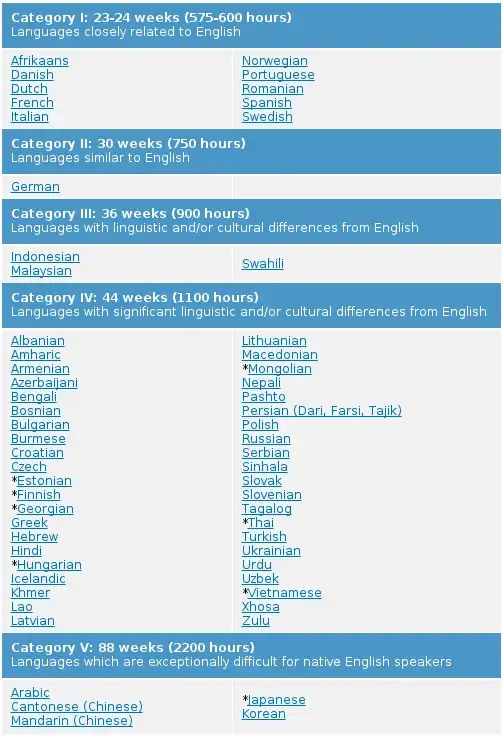Basically what I'm just asking in the question's title. By learning a language, I mean being able to fluently speak it, understand it, write it, and read it. I would think French or German. Please include references to scientific research in your answers.
-
Do you mean on average? (Of all English speakers who learned another language, the average time to fluency was lowest for X language)? Do you mean which language is most similar grammatically to English (probably Frisian)? Do you mean, which language has the shortest intensive, full-immersion program that can provide fluency in the shortest time? – Flimzy Apr 05 '16 at 19:29
-
@Flimzy on average. – fi12 Apr 05 '16 at 19:39
-
6The concept of Linguistic Distance is a valid (IMHO) topic on this site as well as the common use of relative linguistic difficulty from one language to another. – callyalater Apr 05 '16 at 21:31
2 Answers
According to the Foreign Service Institute (FSI), there are categorical rankings of difficulty in learning a language relative to English. A list can be found here with approximate time to become adequate in that language.
Another concept closely related to this is Linguistic Distance. Linguistic distance involves how similar one language is to another (though most implementations of calculating this focus on vocabulary) with regard to some linguistic feature (usually wordbase). The similarities can be calculated mathematically using Levenshtein Distance.
For example, from the Wikipedia article:
Based on this, one study compared both Afrikaans and West Frisian with Dutch to see which was closer to Dutch. It determined that the Dutch and Afrikaans (mutual distance of 20.9%) were considerably closer than Dutch and West Frisian (mutual distance of 34.2%).
Additional resources can be found here, here, here, and here.
- 1,881
- 12
- 27
-
5The FSI rankings are cited in many books about language learning, but are there any scientific publications about it? Has anyone tried to correlate the FSI ranking with the Levenshtein distance or any of the other metrics? – Tsundoku Jul 31 '16 at 19:16
It is reasonable to argue that Norwegian or Afrikaans are the easiest, and therefore the fastest, languages to learn for a native English speaker.
Page F30 argues that (bokmål) Norwegian was the easiest, because:
- Many cognates (as with other Germanic languages) and is a Germanic language like English.
- Much easier grammar than other Germanic languages, with some of the easiest verb conjugations in all of Europe.
- Word order is very similar to English, unlike, say, German with its end-of-sentence verbs.
- Forming the Passive Voice is simple
He also argues, in a subsequent article, that Afrikaans is nearly as easy:
- No grammatical gender (like English!), which is rare for an Indo-European language.
- Verb conjugation is, like Norwegian, also super easy.
- Spelling was simplified and is intuitive for an English speaker.
The only reason either of these languages could possibly be considered "hard" is due to fewer learning resources when compared to the major languages (Spanish, German, etc).
- 5,076
- 3
- 21
- 53
-
3On a first look, the website does not seem to refer to scientific research to back up its claims. – Tommi Jun 07 '18 at 07:41
-
I've heard that Norwegian has phonemic tone, which of course causes huge problems for people who aren't used to it. – Aug 24 '18 at 12:34
